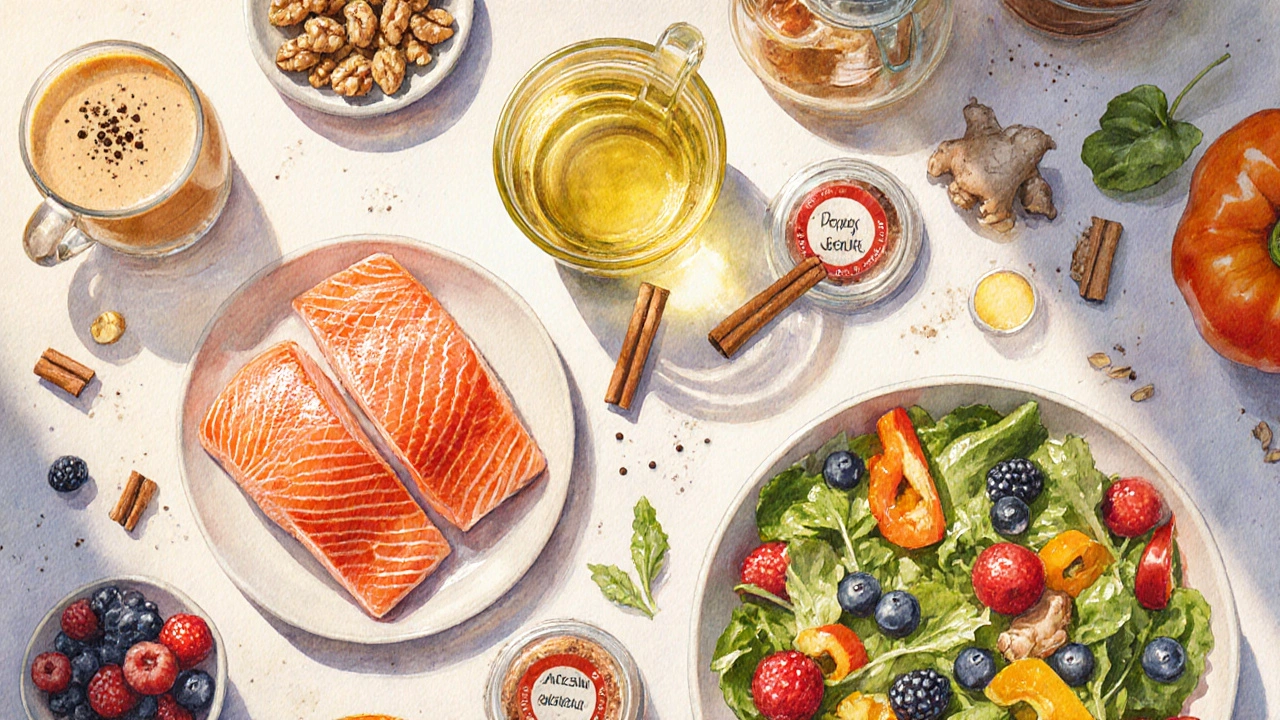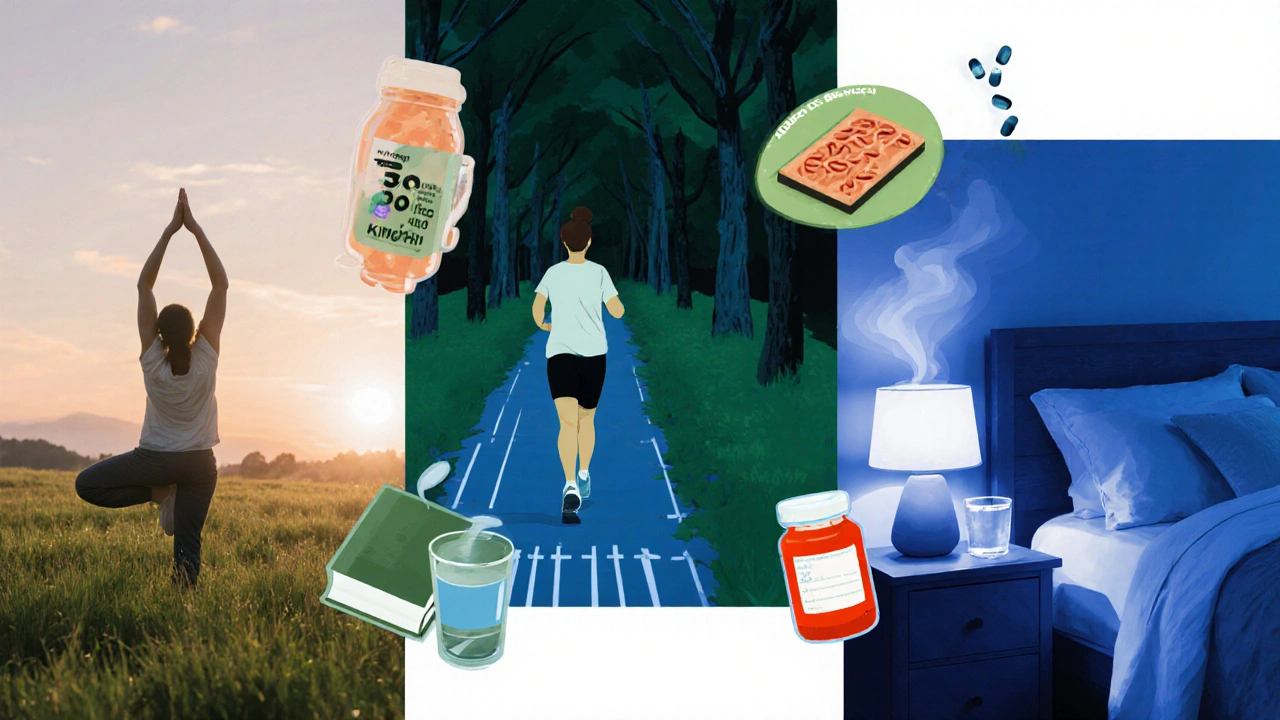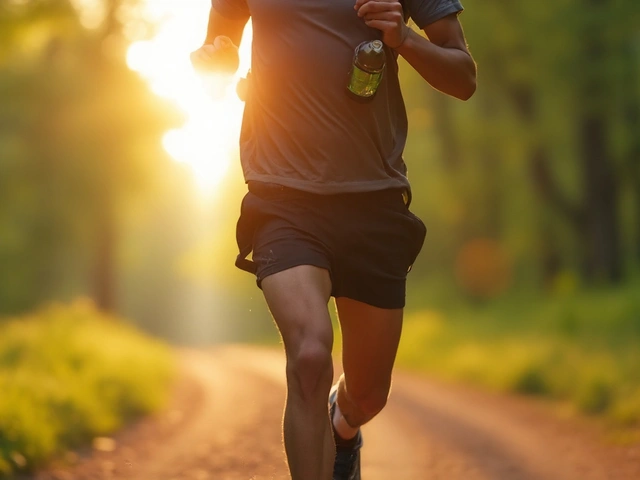Anti-Inflammatory Lifestyle Checker
Your results will appear here after clicking "Check My Anti-Inflammatory Score".
Ever felt achy joints, persistent fatigue, or a stubborn belly bloat that just won’t quit? Chances are, low‑grade inflammation is playing a part. The good news is you don’t need a prescription bottle to calm it down. Below are practical, research‑backed steps you can start today to reduce inflammation naturally and feel better faster.
TL;DR - Quick Wins
- Load your plate with omega‑3‑rich fish, nuts, and seeds.
- Swap refined carbs for colorful veggies and whole grains.
- Move your body for at least 30minutes most days.
- Practice stress‑busting habits like deep breathing or short walks.
- Add turmeric, ginger, or green tea to your daily routine.
What Is Inflammation?
Inflammation is a natural immune response that helps the body fight infection, heal injuries, and clear out damaged cells. When the system stays activated for too long, it turns into chronic, low‑grade inflammation that quietly damages tissues and fuels diseases like arthritis, heart disease, and even depression. Understanding the difference between acute (good) and chronic (bad) inflammation is the first step toward tackling it.
Common Triggers That Keep Inflammation Running
While occasional soreness after a workout is normal, certain habits keep the fire smoldering:
- Excess sugar and refined carbs that spike insulin.
- Processed foods loaded with trans fats and additives.
- Chronic stress that floods the body with cortisol.
- Sleep deprivation - fewer than 7 hours nightly.
- Gut imbalance - too many harmful bacteria, not enough friendly ones.
Food Strategies: Eat to Calm the Fire
Diet is the most powerful lever you have. Below are the star players that science repeatedly links to lower inflammatory markers.
Omega-3 fatty acids are polyunsaturated fats found in fatty fish, flaxseeds, and walnuts that curb the production of inflammatory eicosanoids.
Aim for two servings of oily fish such as salmon, sardines, or mackerel each week. If you’re vegetarian, a tablespoon of ground flaxseed or a handful of walnuts daily can supply a comparable dose.
Antioxidant‑rich fruits and veggies
Berries, leafy greens, and brightly colored vegetables pack flavonoids and polyphenols that neutralize free radicals, a key driver of inflammation. Try a mixed‑berry smoothie for breakfast or a rainbow salad for lunch.
Mediterranean diet combines whole grains, legumes, olive oil, fish, and plenty of plant foods, creating a balanced anti‑inflammatory eating pattern.
Research from the American Heart Association shows people following this diet have up to 30% lower C‑reactive protein (CRP) levels, a common inflammation marker.
Spice it up
Turmeric, ginger, cinnamon, and garlic aren’t just flavor boosters; they contain bioactive compounds that switch off inflammatory pathways. A pinch of turmeric in a golden milk latte or fresh ginger in a stir‑fry adds both taste and health benefits.

Lifestyle Moves: Move, Rest, and De‑Stress
Even the best diet can’t fully offset a sedentary, high‑stress lifestyle.
Exercise regular moderate‑intensity activity reduces visceral fat and releases myokines, proteins that have anti‑inflammatory effects.
Aim for 150 minutes of brisk walking, cycling, or swimming each week. If you’re short on time, three 10‑minute bouts spread throughout the day work just as well.
Stress Management
When stress spikes, cortisol triggers inflammatory cytokines. Techniques like deep‑breathing, progressive muscle relaxation, or a 5‑minute mindfulness session can lower cortisol within minutes.
Sleep Quality
Missing out on restorative sleep disrupts the body’s nightly repair processes, raising IL‑6 and TNF‑α, two key inflammatory markers. Keep a dark, cool bedroom, limit screens an hour before bed, and aim for 7‑9 hours of uninterrupted sleep.
Gut Health: Probiotics and Prebiotics
A balanced microbiome keeps the gut lining tight, preventing “leaky gut” that lets inflammatory substances seep into circulation.
Probiotics live beneficial bacteria that restore microbial balance and modulate immune responses.
Fermented foods like kefir, yogurt with live cultures, sauerkraut, and kimchi deliver a natural probiotic boost. For a more targeted approach, a daily supplement containing Lactobacillusrhamnosus and Bifidobacteriumlongum has been shown to lower CRP by up to 15% in clinical trials.
Prebiotic fibers
Foods such as garlic, onions, leeks, asparagus, and bananas feed good bacteria, reinforcing their anti‑inflammatory effects.
Herbal & Spice Remedies: Concentrated Powerhouses
When you need a potent anti‑inflammatory kick, look to extracts that isolate the active compounds.
Curcumin the bright yellow compound in turmeric that inhibits NF‑κB, a master regulator of inflammation.
Standardized extracts (95% curcuminoids) taken with a pinch of black‑pepper extract (piperine) boost absorption by 2000%. A typical dose is 500mg twice daily.
Ginger
Fresh ginger or a ginger‑root supplement provides gingerols, which reduce COX‑2 enzyme activity. A 2‑gram daily dose has been shown to cut exercise‑induced inflammation in runners.
Green Tea
Rich in epigallocatechin‑3‑gallate (EGCG), green tea dampens inflammatory cytokine release. Drinking 2-3 cups a day or using a high‑EGCG extract (300mg) can lower CRP by 10-12%.
Quick Anti‑Inflammatory Checklist
- Eat at least two servings of omega‑3‑rich fish or plant sources weekly.
- Fill half your plate with non‑starchy vegetables at every meal.
- Include a spice with anti‑inflammatory properties daily (turmeric, ginger, cinnamon).
- Move for 30minutes most days - walk, bike, or stretch.
- Practice a 5‑minute stress‑relief technique (breathing, meditation) each morning.
- Prioritize 7-9 hours of sleep; create a cool, dark bedroom.
- Consume fermented foods or a probiotic supplement daily.
- Swap sugary drinks for water, herbal tea, or infused water.
Comparison Table: Food vs. Natural Supplement Sources
| Source | Main Anti‑Inflammatory Compound | Typical Daily Amount | Best Time to Consume | Notes |
|---|---|---|---|---|
| Salmon (wild) | EPA/DHA (Omega‑3) | 150g | Lunch or dinner | Rich in protein; choose wild‑caught for higher omega‑3. |
| Walnuts | Alpha‑linolenic acid (ALA) | 30g (≈¼ cup) | Snack | Store in fridge to prevent oxidation. |
| Turmeric powder | Curcumin | ½tsp (≈2g) + pinch pepper | Morning smoothie or golden milk | Pair with black pepper for better absorption. |
| Standardized curcumin supplement | Curcumin (95%) | 500mg twice | With meals | Check for piperine or lipid‑based formula. |
| Green tea ( brewed) | EGCG | 2-3 cups | Mid‑morning or early afternoon | Avoid adding milk if you want maximum EGCG. |
| Probiotic capsule | Live cultures (L.rhamnosus, B.longum) | 10billion CFU | Before breakfast | Store per manufacturer instructions. |

Frequently Asked Questions
Can I reverse chronic inflammation with diet alone?
Diet is a cornerstone, but the fastest results come from a combined approach: clean eating, regular movement, stress control, and adequate sleep. Together they create a synergistic effect that can lower CRP and improve symptoms within weeks.
How much turmeric is needed for an anti‑inflammatory effect?
Research suggests 500mg of a 95% curcumin extract taken twice daily, or about 1-2tsp of culinary turmeric plus a pinch of black pepper, can provide measurable benefits.
Is exercise safe if I already have joint inflammation?
Low‑impact activities like walking, swimming, or cycling actually reduce joint swelling by improving circulation and lubricating the cartilage. Start with short sessions and gradually increase duration.
Do probiotics work for everyone?
Most people benefit, but strain selection matters. If you have specific conditions (IBS, eczema, etc.), choose a formulation that targets those issues. Consulting a healthcare professional can fine‑tune the choice.
Can stress‑relief techniques lower blood markers of inflammation?
Yes. A 2016 study showed that an eight‑week mindfulness program reduced CRP by roughly 18% in participants with high baseline levels.





Barbara Todd
October 1, 2025 AT 20:50I’ll start by swapping my morning cereal for a berry‑rich smoothie.
nica torres
October 9, 2025 AT 16:17Love the checklist vibe! I’ve already added a turmeric latte to my morning routine and it feels like a tiny victory. Adding omega‑3s is next on my list – a handful of walnuts with my afternoon coffee. The stress‑relief tip is gold; a quick 5‑minute breathing session really clears the fog. Keep the momentum going, folks – every small habit stacks up!
Dean Marrinan
October 17, 2025 AT 11:44Wow, the post is basically a cheat‑sheet for turning into a wellness influencer 🤷♂️. I mean, who needs a pharmacy when you’ve got kale and ginger, right? 🍃💪 If only my couch would stop being so persuasive about Netflix binge‑watching. Still, I’ll try the 30‑minute walk and see if my knees stop sounding like a marching band.
Oluseyi Anani
October 25, 2025 AT 07:11This is a solid rundown, especially the part about gut health; I’ve seen many patients overlook it. The emphasis on whole foods over processed snacks aligns with what the latest nutrition research suggests. Adding fermented foods like kimchi can truly tighten the gut barrier, lowering systemic inflammation. Also, the recommendation to pair curcumin with black pepper is often missed, but it boosts absorption dramatically. I’d add that consistent sleep hygiene can improve the efficacy of all these other interventions.
Jeremy Wolfe
November 2, 2025 AT 01:38Great points, Oluseyi! Think of each habit as a rep in a workout – consistency beats intensity. Start with a 5‑minute stretch before bed; it sets the tone for deeper sleep. Pair that with a daily probiotic capsule, and you’ll notice reduced bloating within weeks. Keep tracking your progress; the checklist in the post makes it easy. You’ve got this!
Rahul yadav
November 9, 2025 AT 21:06Honestly, reading this feels like a warm hug for my inflamed joints 😊. I’ve always loved spicy food, but I never realized turmeric could be a superhero for inflammation. I’m going to toss some fresh ginger into my morning tea – it smells amazing! Also, I’ll finally give that 30‑minute walk a shot; my couch is strong, but I’m stronger. Thanks for the motivation, everybody!
Dan McHugh
November 17, 2025 AT 16:33Decent list, but I’m not sure I’ll change my habits.
Sam Moss
November 25, 2025 AT 12:00Fair enough, Dan. Even swapping one sugary soda for water each day can shave off some inflammation. If you add a handful of berries to breakfast, you get antioxidants without extra effort. Small steps add up, and you might surprise yourself with the results.
Suzy Stewart
December 3, 2025 AT 07:27Love the energy! Let’s crank up those omega‑3s and get that CRP down – 💪🔥. Consistency is key, so set a reminder and crush it daily.
Traven West
December 11, 2025 AT 02:54Minor nitpick: “food versus supplement” should be “food vs. supplement”.
Jonny Arruda
December 18, 2025 AT 22:21True, grammar matters.
Melissa Young
December 26, 2025 AT 17:49Yo, this is straight fire for anyone who wants to shut down that chronic inflammation hype. Cut the junk, load the greens, and watch your body bounce back. No fluff, just results.
SHASHIKANT YADAV
January 3, 2026 AT 13:16Whoa, this article is a treasure trove of practical tips that feel both scientific and doable. First, the emphasis on omega‑3s reminded me that I’ve been neglecting fatty fish for the sake of convenience. Adding a salmon fillet twice a week isn’t daunting when I plan meals ahead. The suggestion to sprinkle turmeric on roasted veggies is a game‑changer; I’ll definitely try that tonight. I also appreciate the note about pairing curcumin with black pepper – the absorption boost is something many overlook. The stress‑relief section hits home because my job is high‑pressure, and a 5‑minute breathing routine is something I can slot in between meetings. Sleep hygiene is another area where I struggle; the tip about keeping the room cool and dark is simple yet powerful. Gut health is often underrated, and I’m glad the post highlighted fermented foods like kimchi and kefir – I used to think they were just trendy. The comparison table between food sources and supplements clarified dosages for me, especially the point about lipid‑based curcumin formulas. I love that the checklist at the end breaks everything into bite‑size actions, making it less overwhelming. One thing I’ll start with is swapping sugary drinks for green tea; the EGCG content will give my metabolism a gentle push. Also, the reminder to store walnuts in the fridge to prevent oxidation is spot‑on; I’ve been eating them straight out of the pantry and probably losing potency. Overall, the article feels like a friendly coach walking you through each step, rather than a lecture. I’m excited to track my anti‑inflammatory score over the next few weeks and see measurable progress. Thanks for the thorough, evidence‑backed guide!
Ryan Pitt
January 11, 2026 AT 08:43Excellent summary, SHASHIKANT! You’ve captured the key points perfectly – keep it up and the inflammation will melt away.